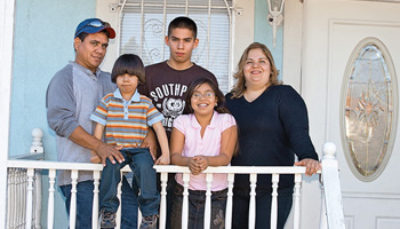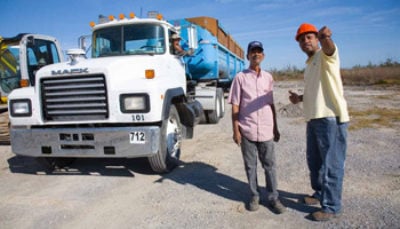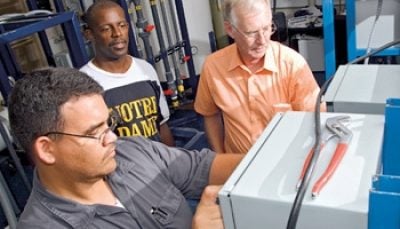Helping low-income parents and other adults find good jobs and steady incomes.
National partnerships and state-level initiatives are building workers’ skills to meet employers’ needs while also strengthening policies for adult education, job training, economic development and other resources to help individuals find and keep jobs and build careers.
Economic Opportunity
<p><a href="http://www.nfwsolutions.org/" target="_blank" title="Working Poor Families Project">National partnerships</a> and <a href="http://www.workingpoorfamilies.org/" target="_blank" title="National Fund for Workforce Solutions">state-level initiatives</a> are building workers’ skills to meet employers’ needs while also strengthening policies for adult education, job training, economic development and other resources to help individuals find and keep jobs and build careers. </p>
National, state partnerships build worker skills to meet employer needs + get adults on career path
https://www.aecf.org/work/economic-opportunity
Nearly 6.5 million U.S. teens and young adults are neither in school nor in the workforce. With new research, Casey offers recommendations to support youth in gaining a stronger foothold in the economy.
Economic Opportunity
<p>Nearly 6.5 million U.S. teens and young adults are neither in school nor in the workforce. With new research, Casey offers recommendations to <a href="/resources/youth-and-work" title="Report: Youth and Work">support youth in gaining a stronger foothold in the economy</a>.</p>
~6.5 mil US teens + young adults not in school or working. Must help them connect to opportunity.
https://www.aecf.org/work/economic-opportunity
Throughout the nation, the Integrated Basic Education and Skills Training program equips individuals with the literacy, work and life skills they need to earn credentials and get to work.
Economic Opportunity
<p>Throughout the nation, the <a href="http://www.sbctc.ctc.edu/college/e_integratedbasiceducationandskillstraining.aspx" target="_blank" title="Integrated Basic Education and Skills Training">Integrated Basic Education and Skills Training</a> program <a href="https://www.youtube.com/watch?v=KwC3jel9ZkA&feature=youtu.be" target="_blank" title="Video: Maryland Integrated Basic Education and Skills Training">equips individuals with the literacy, work and life skills</a> they need to earn credentials and get to work.</p>
I-BEST equips ppl w literacy, work + life skills needed to earn credentials and get to work.
https://www.aecf.org/work/economic-opportunity
Supporting working parents and other adults to manage their money effectively and meet immediate needs.
Between 2001 and 2008, 1.37 million free tax returns were prepared at Volunteer Income Tax Assistance sites across the country in an effort to help families leverage the earned income tax credit without paying large fees.
Economic Opportunity
<p>Between 2001 and 2008, 1.37 million free tax returns were prepared at <a href="http://www.irs.gov/Individuals/Free-Tax-Return-Preparation-for-You-by-Volunteers" target="_blank" title="Free Tax Return Preparation for Qualifying Taxpayers">Volunteer Income Tax Assistance</a> sites across the country in an effort to help families leverage the <a href="/resources/ten-years-of-the-eitc-movement" title="Report: Ten Years of the EITC Movement">earned income tax credit</a> without paying large fees.</p>
VITA helps #lowincome families w free tax-return prep, accessing tax credits, avoiding fees
https://www.aecf.org/work/economic-opportunity
Recognizing that a job is not enough, Casey’s Center for Working Families approach connects low-income individuals to public benefits, tax credits and job training, while also providing financial coaching and education to help families budget for household needs and plan for the future.
Economic Opportunity
<p>Recognizing that a job is not enough, Casey’s <a href="/work/past-work/center-for-working-families" title="Center for Working Families">Center for Working Families</a> approach connects low-income individuals to public benefits, tax credits and job training, while also providing financial coaching and education to help families budget for household needs and plan for the future.</p>
A job is not enough. Training, coaching + education help #lowincome families get financially stable
https://www.aecf.org/work/economic-opportunity
Encouraging parents and other adults to pay off debt and remain financially stable for the long term.
During the Great Recession, families in low-income neighborhoods were disproportionately affected by the crisis due to targeted subprime lending, less access to traditional credit sources and higher unemployment rates.
Economic Opportunity
<p>During the Great Recession, families in low-income neighborhoods were <a href="/resources/weathering-the-recession" title="Report: Weathering the Recession">disproportionately affected</a> by the crisis due to targeted subprime lending, less access to traditional credit sources and higher unemployment rates.</p>
Recession affects #lowincome families: subprime lending, less access to credit sources, higher unemployment
https://www.aecf.org/work/economic-opportunity
With some 70 million Americans having poor credit scores or no credit history, the Foundation has developed tips to help families avoid money traps that can drag down credit scores.
Economic Opportunity
<p>With some 70 million Americans having poor credit scores or no credit history, the Foundation has developed tips to help families avoid <a href="https://www.youtube.com/watch?v=zmg9NfsJelU" target="_blank" title="Video: Pursuit of the Dream (Building Credit for Life)">money traps</a> that can drag down credit scores.</p>
70 mil in US have poor credit scores or no credit history. Get tips on avoiding money traps.
https://www.aecf.org/work/economic-opportunity







